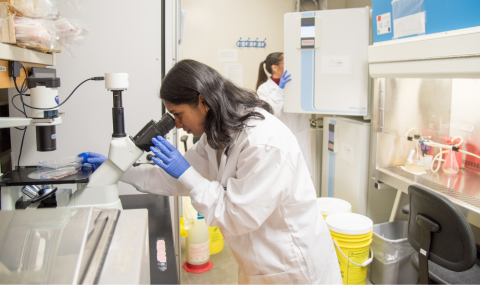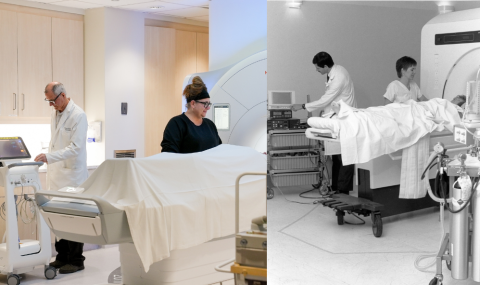MEDIA RELEASE
For Immediate Release:
April 17, 2018
LONDON, Ontario – April 17 is World Hemophilia Day, a day of awareness, of celebration and - for staff and patients of London Health Sciences Centre’s Bleeding Disorders Program - a clinic day.
Hemophilia is typically a hereditary genetic condition which severely reduces the ability of the blood to clot, causing prolonged bleeding from even a slight injury.
“It is important to understand that a person with hemophilia does not bleed faster, they bleed longer,” said Lori Laudenbach, Nurse Practitioner for the Bleeding Disorders Program (BDP). “The condition can be managed and we’ve come a long way in helping families understand how to do that while still allowing the person with hemophilia to live a full, active life.”
Serving over 325 patients, the BDP uses a comprehensive, interdisciplinary care model bringing together a hematologist, nurse practitioner, social worker and physiotherapist to coordinate care needs for each individual patient and their family.
One of those patients is Paul Wilton, who was diagnosed with hemophilia when he was a toddler. Unusual bruising and a family history of the condition prompted Wilton’s parents to bring him to the hospital where a blood test confirmed their suspicions that their son had hemophilia. In one third of all new cases of hemophilia there is no family history.
“As a child with hemophilia trying to live a normal life, it was inevitable that accidents would occur. We reached the point where staff in the Emergency Department knew my name when I came in and knew exactly what they needed to do to help me,” said Wilton. “We spent a lot of time in the emergency room.”
There have been advancements in hemophilia care over the years such as the development of synthetic clotting factor that is given through injection into the patient’s bloodstream, temporarily replacing what is missing or low to restore the body’s natural clotting ability. There has also been a movement to teach families how to infuse this factor in a preventative manner at home preserving joints and saving countless visits to hospital. As a result of this progress in treatment options, the life expectancy for people with hemophilia is approaching that of the general population.
However, there have been challenging times as well. The tainted blood crisis in the early 1980’s caused great fear among patients and families. It changed the way factor was infused for some, administering it on an as-needed basis as opposed to preventatively to reduce the chance of contracting HIV or hepatitis C.
Today, even with proactive treatments, patients still experience the impact of hemophilia including the breakdown of joints worn out from years of blood pooling within them, a condition Wilton faces daily. “There are definitely challenges to living with hemophilia, but over my lifespan, there have been great advances as well. We just need to keep moving forward.” Wilton does his part toward that, working in advocacy roles, including serving as president of the Canadian Hemophilia Society (CHS). “CHS and LHSC have a strong partnership because we are working toward the same thing – the best care possible for patients.”
“Working together with our patient groups, we have been able to identify and work toward meeting the unique needs of our patient population,” said Laudenbach. “We are fortunate to have access to safe treatment options for patients that help them lead normal, long lives, and I am hopeful that this care will continue to evolve and serve patients even better in the future.”
**Media interviews with Lori Laudenbach and Paul Wilton are available Tuesday, April 17 from 1-2pm. Contact Kathy Leblanc to book. **
About London Health Sciences Centre
London Health Sciences Centre has been at the forefront of medicine in Canada for 142 years and offers the broadest range of specialized clinical services in Ontario. Building on the traditions of its founding hospitals to provide compassionate care in an academic teaching setting, London Health Sciences Centre is home to Children’s Hospital, University Hospital, Victoria Hospital, the Kidney Care Centre, two family medical centres, and two research institutes – Children’s Health Research Institute and Lawson Health Research Institute. As a leader in medical discovery and health research, London Health Sciences Centre has a history of over 70 international and national firsts and attracts top clinicians and researchers from around the world. As a regional referral centre, London Health Sciences Centre cares for the most medically complex patients including critically injured adults and children in southwestern Ontario and beyond. The hospital’s nearly 15,000 staff, physicians, students and volunteers provide care for more than one million patient visits a year. For more information visit www.lhsc.on.ca
- 30 -
For media inquiries contact:
Kathy Leblanc
Corporate Communications and Public Relations
London Health Sciences Centre
519-685-8500, ext. 74772
kathy.leblanc@lhsc.on.ca
After-hours assistance:
Call LHSC Switchboard at 519-685-8500 and ask to page the communication consultant on-call
Visit the LHSC Media web site at www.lhsc.on.ca/media
Like us on Facebook at London Health Sciences Centre (LHSC), follow us on Twitter @LHSCCanada and watch us on YouTube at LHSCCanada.


